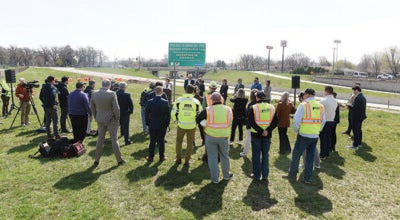This Week in History: Fire guts interior of K&L Diner in Albert Lea
Published 9:02 pm Tuesday, May 12, 2020
|
Getting your Trinity Audio player ready...
|
Local
May 13, 1990: The Hudson Foods plant in Albert Lea canceled the scheduled layoff of 81 employees and called back 17 workers previously laid off.
May 16, 1970: A fire completely gutted the interior of K&L Diner on North Broadway. Firefighters were able to confine the flames to the cafe and saved the upstairs apartments and the Palace-McGregor Furniture store next door.
May 12, 1970: The Evening Tribune ran the death notice of Vernon Lee Okland of Lake Mills. Okland was killed in a combat operation on May 5, 1970, in Vietnam. Okland was a rifleman in Company C., 2nd Battalion, 502nd Infantry of the 101st Airborne.
National
2019: The White House’s top economic adviser acknowledged on “Fox News Sunday” that U.S. consumers and businesses pay the tariffs that the administration had imposed on billions of dollars of Chinese goods.
Sending Wall Street into a slide, China announced higher tariffs on $60 billion in U.S. goods in retaliation for President Donald Trump’s latest penalties on Chinese products; the Dow industrials finished more than 600 points lower.
California fire officials said an investigation found that power lines owned by Pacific Gas & Electric Corp. had sparked a Northern California blaze that killed 85 people and nearly destroyed the town of Paradise in 2018; it was the deadliest U.S. wildfire in a century.
2015: The House voted 338-88 to end the National Security Agency’s bulk collection of Americans’ phone records and replace it with a system to search the data held by telephone companies on a case-by-case basis. (The measure was passed by the Senate and signed into law by President Barack Obama.)
A jury sentenced Dzhokhar Tsarnaev to death for the 2013 Boston Marathon bombing that killed three and left more than 250 wounded.
2010: Three Pakistani men who authorities say supplied funds to would-be Times Square bomber Faisal Shahzad were arrested in a series of raids in New England. President Barack Obama met with police officers who responded to the attempted car-bombing, greeting them at the New York Police Department’s high-tech Real Time Crime Center.
2008: The Interior Department declared the polar bear a threatened species because of the loss of Arctic sea ice.
2006: Lawmakers demanded answers after a USA Today report that the National Security Agency was secretly collecting records of millions of ordinary Americans’ phone calls; President George W. Bush sought to assure Americans their civil liberties were being “fiercely protected.”
The Pentagon released the first video images of American Airlines Flight 77 crashing into the military headquarters and killing 189 people on 9/11.
2004: Massachusetts became the first state to allow same-sex marriages.
2002: Former President Jimmy Carter ended a historic visit to Cuba sharply at odds with the Bush administration over how to deal with Fidel Castro, saying limits on tourism and trade often hurt Americans more than Cubans.
1996: President Bill Clinton signed a measure requiring neighborhood notification when sex offenders move in. (“Megan’s Law,” as it’s known, was named for Megan Kanka, a 7-year-old New Jersey girl who was raped and murdered in 1994.)
1991: Queen Elizabeth II became the first British monarch to address the United States Congress as she lauded U.S.-British cooperation in the Persian Gulf War.
1981: Legendary reggae artist Bob Marley died in a Miami hospital at age 36.
1973: The espionage trial of Daniel Ellsberg and Anthony Russo in the “Pentagon Papers” case came to an end as Judge William M. Byrne dismissed all charges, citing government misconduct.
A special committee convened by the U.S. Senate began its televised hearings into the Watergate scandal.
1968: Two days of tornado outbreaks began in 10 Midwestern and Southern states; twisters were blamed for 72 deaths, including 45 in Arkansas and 18 in Iowa.
1961: Freedom Riders were attacked by violent mobs in Anniston and Birmingham, Alabama.
1958: The United States and Canada signed an agreement to create the North American Air Defense Command (later the North American Aerospace Defense Command, or NORAD).
1954: The Fender Stratocaster guitar, created by Leo Fender, was officially released.
A unanimous U.S. Supreme Court handed down its Brown v. Board of Education of Topeka decision which held that racially segregated public schools were inherently unequal, and therefore unconstitutional.
1943: During World War II, U.S. forces landed on the Aleutian island of Attu, which was held by the Japanese; the Americans took the island 19 days later.
1942: Wartime gasoline rationing went into effect in 17 Eastern states, limiting sales to three gallons a week for non-essential vehicles.
1862: President Abraham Lincoln signed an act establishing the Department of Agriculture.
1858: Minnesota became the 32nd state of the Union.
1804: The Lewis and Clark expedition to explore the Louisiana Territory as well as the Pacific Northwest left camp near present-day Hartford, Illinois.
May 17, 1792: The New York Stock Exchange had its beginnings as a group of brokers met under a tree on Wall Street and signed the Buttonwood Agreement.
1607: English colonists arrived by ship at the site of what became the Jamestown settlement in Virginia (the colonists went ashore the next day).





